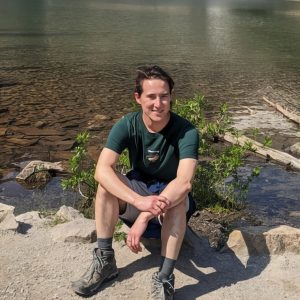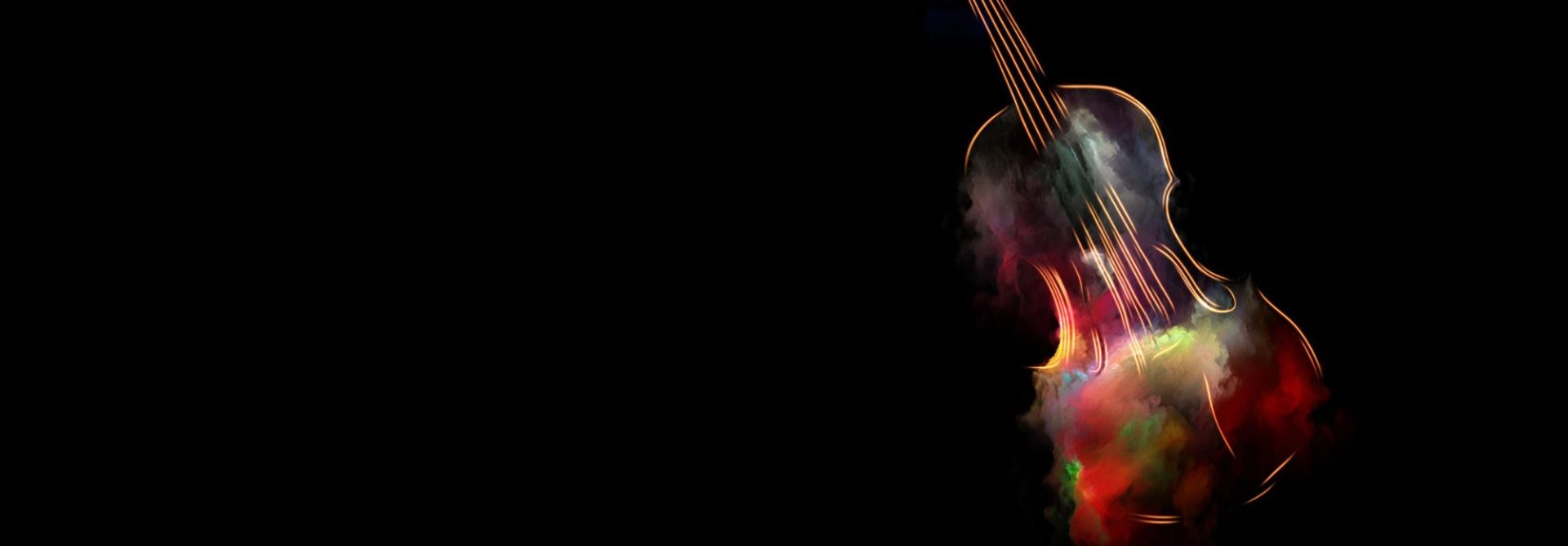Shortly after, Alexandru flutters his fingers in goodbye and slips out the back door of the abandoned house, Vasile takes the bus to Old Town, struggling under the weight of their luggage. He checks into a hotel and leaves most of their things there, then wanders down to Vărzărie, paying for a coffee he can’t stop stirring as he stares out the window. To kill time, he imagines passersby are dhampiri or valve pădurii that have come out of the forest—even if he isn’t the one who believes in folk magic.
The sun begins to set slowly. Vasile’s drink has long-since gone cold, and a man two tables over has started smoking, the acrid tobacco stinging Vasile’s sinuses. Anxiety has his leg bouncing under the table as the sky grows darker—cloudless cerulean turning to cobalt, then navy.
There’s no need to be worried, he tells himself over and over. Sometimes Alexandru is late to things—he’s easily distracted by feeding pigeons, or chasing after fairies he thinks he’s seen, or picking up fallen feathers, sure they’re a trail to something better.
The sky starts to fade to black, the frail hands of the wire clock on the wall twitching higher. Uneasiness stirs at the bottom of Vasile’s stomach as the first star ignites faintly above. Alexandru hasn’t appeared on the sidewalk—hands in the pockets of his felt coat, hair bouncing wildly behind him.
Jittery, Vasile leaves his coffee untouched, the spoon lying heavy in the still-swirling liquid. He catches a waitress and tells her that if she sees a short woman in her late twenties who dresses like a man, please tell her to wait here. Then he leaves, struggling to hold two violin cases in one hand and a small bag of valuables in the other, catching the bus back to Donath.
Alexandru can’t be found in the abandoned house when Vasile creeps through the building, nor has anybody on the street seen him.
Heart beginning to beat harder, Vasile forces himself to loosen the white-knuckled grip he has on the violin cases. Alexandru is fine. Alexandru can take care of himself. Alexandru has likely made up with Wadim—because that’s just the kind of person he is—and has asked to stay the night because it’s gotten too dark too quickly.
Wadim, Vasile knows, lives outside the city limits, where stray houses meld slowly into small farms just south of the Pădurea Hoia. The rutted dirt road trailing out to nowhere is scattered with stones that bite through the soles of his shoes. As he leaves the lights of Cluj-Napoca behind, more stars appear in the sky like holes poked in a closed box to let an entrapped animal breathe.
Vasile can hardly breathe: the night is too hot, and his skin too tight. The only noise is the crunch of his steps on gravel and the rush of his breathing as he speeds up, imagining movement behind him. A small fence has picked up on the right side of the road, silver wires like the tails of falling stars trailing from one wooden post to another. Ahead, a pale owl perched on one of the stakes swivels its head.
Spooked, it takes off silently.
With a glance behind him, Vasile quickens his pace to a jog—and then a run, his feet pounding on the hard ground and jarring his bones. The violins and the bag are boulders, his shoulders screaming and lungs burning.
Eventually, his body forces him to slow. He glances around, panting. A faint, beaten path leads off the main road, where the wires have broken between two posts—trampled grass leading to the looming shadows of the Pădurea Hoia, a field away.
Ahead, a solid shadow leans heavily against the fence, the wires pulled taut under it.
The barn owl alights there momentarily, notices Vasile watching, and takes off again.
After a hesitant glance down the path, Vasile continues down the road, eyes on the thing caught on the fence. A sickly feeling begins to rise in him, stroking the back of his throat. The darkness is coalescing into a clear shape: the body of a human, crucified, hanging limp and still, arms spread wide like a soaring bird.
Vasile drops the duffel with numb fingers.
He makes an involuntary, whimpering noise as he creeps closer. Sweet blood sings in the air, and he recognizes the ripped turtleneck and tailored slacks before he sees Alexandru’s face—and the deep gash on the side of his neck yawning, open and twisting his head lifelessly to the side so that he stares sightlessly ahead.
Vasile screams.
And screams. And screams.
Alexandru’s fingers are pinioned open against the wire like the feather tips of spread hawk wings, dark streams of blood twining down his arms and throat. His pants have been yanked half off, tangled around his knees, and there are bruises on the insides of his thighs, linked by thin rivulets of dark liquid smeared by foreign fingerprints.
Vasile stumbles off the road into the ditch, dog rose thorns scraping at his skin, the violins falling from his grasp. As he gets closer, the smell—cloying and rancid—makes him gag. At the sight of Alexandru’s dry, glassy eyes and the severed muscle at his neck, graced by the delicate flash of white bone, he gags and turns aside just before he throws up.
“No, no, no,” he moans, spitting the string of bile trailing from his lips and wiping his mouth. He can’t look Alexandru in the face, where tear tracks have cleaned trails through the dirt and blood smudged there, so he yanks at the rough knots of rope around Alexandru’s swollen wrists until his fingers are numb. Alexandru’s skin is cool and stiff, and when Vasile frees him of his bindings, he falls heavily to the ground with a chilling, solid thud.
Vasile crumples beside him, drawing Alexandru’s head into his lap, not caring about ruining his slacks. “Sandru!” he cries. “Sandru, iubițel, iubițel, dragul meu, Sandru.”
Alexandru’s gaze is fixed on some far point in the sky, his lips parted in wonder.
“Say something,” Vasile pleads, his tongue too thick, rocking back and forth. “Come back to me. Come back to me. I’ll do anything, please. Please! I’ll play folk with you. I’ll follow the birds with you. Anything you want—anything, Sandru, my Sandru.”
He buries his hands in Alexandru’s tangled hair, doubles over, and screams.
And screams.
And screams.
“Sandru!”
He screams to the sky and to the stars and to Romania, as if he can imprint Alexandru’s name upon them and force them to acknowledge whom they have forsaken—the people they turn their backs on so many times they no longer notice when the bodies begin to fall.
“Sandru.” Vasile’s voice breaks, the last syllable silent, as he gently smooths Alexandru’s hair away from his face, pulling stems of dog roses over them as a blanket, not caring about the thorns that tear at his palms. When he tries to speak, his lips and tongue shape the words, but no sound comes out.
Te iubesc. Te iubesc, te iubesc, promit, mereu, micul meu virtuoz.
He closes his eyes and weeps. Blackness comes to sweep him up in its arms, and he buries his twisted face in its shoulder, his throat crushed by tears.
“Vasile?”
He flinches at the sound of his own name.
There’s a man on the road leaning forward to see him better—stocky and simply dressed, a lamp glowing orange in his hand. The sudden light makes Vasile recoil; it glints, oily, off the silver cross that hangs from the man’s neck, flashing like a star.
“It is you,” the man says.
The hair raises on the back of Vasile’s neck.
“I’ve been waiting for you.”
As Vasile’s eyes adjust, he sees the beard and the deep-set eyes under thick eyebrows and the short scar on the man’s left cheek—a perfect match to the photo Alexandru had shown him once. A warning: if you ever saw this man, run the other way.
Wadim.
Vasile was cold, his fingers numb, but something suppressed and unrecognizable was pumping through his heart, viscous and burning.
“She said you would come. She screamed for you.” The words curl ugly through the air. “I want you to know you’re too late. Hope is only a prayer for the living—but it’s useless when heathen gods won’t save you, isn’t it?”
The man steps into the ditch.
Sudden fury bubbling over, Vasile leaps for him.
They crash to the ground, the lantern shattering, flame bursting up where oil spills to lick at the sky.
Vasile smashes his fist down on Wadim’s nose. There’s a hideous crack, and Vasile howls soundlessly at the pain that bursts through his hand.
Wadim bellows—then another man is hauling Vasile back by the collar of his shirt, choking him. The man tosses him aside and whips a kick into his stomach, cracking Vasile’s ribs and driving him back into the bush. He tumbles over the violins, wheezing in agony.
A curl of wind brushes over him—a warning—and he looks up.
There’s a third man. Stretched tall—so tall he could have reached the moon—an axe raised high like salvation. As it comes down, Vasile barely manages to scramble out of the way. It slams into his black violin case, the instrument inside splintering with an excruciating crack.
Wadim pushes himself to his feet. He wipes the blood from his nose, inspecting his hand almost apathetically before his gaze snaps to Vasile’s.
“I’m going to make you regret that.” He holds out his hand to the third man, who yanks the axe out of the earth. “I’m going to make you regret all of it—taking her from me, making her sick in the head!”
Vasile scrambles back. His hand hits Alexandru’s body, waxy and still.
I’m sorry, he says, only sibilant breath hissing out. I’m sorry, Sandru!
As Wadim lifts the axe, Vasile lunges for Alexandru’s violin, still sleeping in its case, and bolts down the ditch back the way he came.
“Why are you staring? Let’s get him!” Wadim screams.
Gravel scatters behind him, and Vasile forces himself faster, tripping over woody plant stalks and scrabbling up in a panic, rushing onward.
He leaps the fence where the wires had snapped, scrambling up the hill to the Pădurea Hoia—toward the paths he’d wandered with Alexandru a lifetime ago. Angry shouts follow close behind.
He clutches Alexandru’s violin tighter, he flies through the dry grass, ignoring his terror at the darkness that looms ahead beneath the canopy of thick leaves bristling in the wind.
Someone barrels into him from behind, felling them both, the violin case pitching from Vasile’s grasp.
“Găozar!” snarls one of Wadim’s men, crawling forward to grab Vasile by the ankle.
Shoulder blazing with agony, Vasile stomps down on the man’s face with the desperation of an injured animal.
With a cut-off screech, the man’s grip disappears, and Vasile shoves himself to his feet, grabbing the violin and limping on. Pain flares with each step as he urges himself into a run again. His lungs rattle, burning, distracting him from the fritz of electricity that dances against his skin as he crosses into the forest, blundering between tree trunks, vision blurring with tears as he hugs Alexandru’s violin.
He doesn’t see how the branches move behind him as he goes—dipping low, growing across—new, fat leaves unfurling, obscuring his blind path with vibrant green.
His lungs feel as though they’re ripping open, blooming with thorned pink flowers, when the trees end abruptly, giving way to a round, empty clearing. Moonlight shines brightly on short grass. Along its edge stands a small white cottage with a towering straw roof, its doors and windows watchful, dark eyes.
On the porch railing, the barn owl alights.
Vasile staggers toward it.
A woman stands out front—heavyset and hunched.
Waiting.
The black apron atop her white dress is embroidered with animals: foxes and bears, goats and eagles. Her face is round and split by deep wrinkles, one eye opened wide and the other lidded—uneven and warped, the farthest thing from perfect that Vasile has ever known. Her nose is long and angular, her lips thin, her hair gray and straggling under her white basma, the red fringes of it dripping over her broad shoulders.
“He’s gone,” he tries to tell her, gasping raggedly for air between the words—whether from his tears or from his escape, he does not know. He’s gone. He’s gone.
“I know,” she rasps.
A strangled, soundless wail ekes out of him. He thinks he might collapse, but she reaches up, cupping his cheeks with thick, strong fingers.
“I know,” she says again, her voice thick. “I am sorry. I am so very sorry.” Her thumbs swipe roughly against his skin, her callouses drying his cheeks. Her grip is tight, tethering him to the ground. “But you are not alone. Do you understand?”
He shakes his head, choked by the tears blurring his vision. He’s gone. I’m alone, I’ve never been so alone.
“You will be safe with me, Nicolescu Vasile. You will see—there is more to this world than you think. You are not the only one.”
She grasps his shoulder, then his upper arm, and he can feel each finger pressing through his shirt.
“Come,” she says. “It is dangerous to stay here.”
He goes, because what else can he do?
He lets her pull him past tables on the porch holding crates of apples and pears. Candlelight flickers through the white lace curtains in the window, reflecting off the leaves of potted plants scattered across the deck. He thinks he sees a red stag—one antler missing, its stub bandaged—sleeping along the side of the house next to two jackal pups, before he catches sight of the barn owl again, a ghost against the night.
The silent tears return, tripping down his cheeks at the memory of Alexandru’s ribs under his fingers that morning, and his dark, soulful eyes; the pen marks of freedom under his chest—half from Vasile, and half from Alexandru himself.
“Vasile,” the old woman says.
He clenches his jaw until it aches; if he opens his mouth, he’ll cry.
“You can do this. You will persevere—you’ll see. In the meantime, we will go far from here.”
He squeezes his eyes shut, throat aching too harshly to speak.
She hobbles up the stone steps of the porch, unlatching the front door and pushing it open. From inside, Vasile hears the scrape of a spoon against a metal pot and the soft sighs of the house as it mourns for him, reaching out with warm air in attempted comfort.
Further in, someone is crooning Sus în vârful muntelui through the crackle of a wood-burning stove.
Tightening his grip on Alexandru’s violin, clutching it to him like a shield, Vasile steps inside.
The old woman enters after him. She pushes the door closed behind her and sets the rusting latch in place, sealing away the outside.
The yard out front is still, wind whispering through the leaves of the potted dog rose to the left of the porch steps. On the railing, the owl ruffles its feathers, head swiveling.
On the outskirts of the sleeping city of Cluj-Napoca, the Pădurea Hoia rustles. A small cottage flickers and, between one second and the next, disappears—as if it had never been there at all.
Just then, a stocky man, bearded and with a broken nose, stumbles out of the trees into the circle of the Poiana Rotundă.
He lurches to a stop and doubles over, breathing hard. Wiping his forehead, he looks around.
From a tree a hundred meters away, a barn owl takes off, gliding across the clearing before disappearing into the dark.
There is no one else there.




